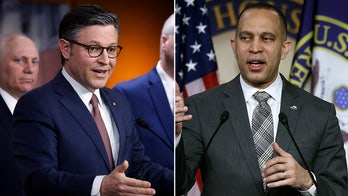The Republican budget proposal outlined by Rep. Paul Ryan Tuesday isn't exactly an effort to repeal President Obama's health care reform law but it undoubtedly works to achieve that end.
"It is not just a budget-it is a cause," Ryan, R-Wisc., told an audience at the American Enterprise Institute on Tuesday 90 minutes after introducing his plan.
Two House committees are working on legislation to strike down what Ryan and many others derisively call "Obamacare." His budget outline calls for significant changes to the public health system but leaves the wholesale attack on the president's reforms to the Commerce and Ways and Means Committees.
Ryan's plan blasts the 2012 budget offered earlier this year by the White House. He says it will accelerate the debt crisis, double the nation's debt and permanently enlarge the size of government. "It offers no reforms to save government health and retirement programs," Ryan decried.
In contrast, Ryan says his overall proposal will save taxpayers more than $6 trillion and will reduce the nation's debt. As for health care, Ryan wants to reform the Medicare system in ways he says the president has ignored. "The open-ended, blank-check nature of Medicare's subsidy mechanism is threatening the solvency of this critical program and creating inexcusable levels of waste in the system."
Ryan offered a personal example in why he believes a market-dominated system will work. He said a decade ago he spent $4,000 for LASIK eye surgery. It's an out-of-pocket expense that now costs 1/3 as much for a more technically advanced procedure. "People shouldn't tell us that health care is immune from free market principles," Ryan observed.
The GOP budget plan claims $1 trillion in savings from Medicare that will be redirected into the health care system. Ryan highlighted it as a key difference from the Obama health care plan that he said raids those funds to create new government programs.
Under Ryan's proposal, starting in 2022, health care companies will compete for new Medicare customers and will receive a government check for each enrollee. Ryan says it's not a voucher program but rather a "premium-support" model that is similar to the Medicare prescription drug benefit program.
"The question for health care going forward is: either health care is going to be run by 30,000 bureaucrats in Washington with command and control and price controls. Or 300 million Americans acting as consumers demanding performance and competition among doctors, hospitals and insurers for our business."




